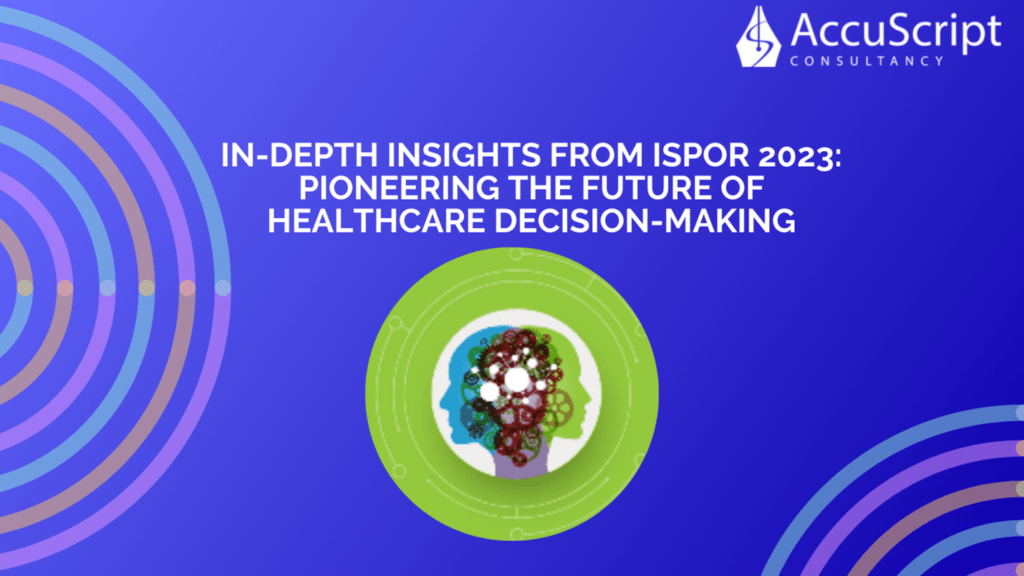ISPOR (May 7, 2023 – May 10, 2023) conference set the stage for groundbreaking discussions on healthcare technology assessment (HTA), real-world evidence (RWE), and market access. This yearly congregation of healthcare leaders, researchers, and policymakers explored the major themes that will dictate the course of healthcare in the coming years. In this article, we will delve deep into the key takeaways that emerged from this important event.

Table of Contents:
1. Harnessing the Power of Real-World Evidence (RWE)
2. Advancing Health Technology Assessment (HTA) in a Changing Landscape
3. Patient-Centricity and Stakeholder Collaboration
4. Embracing the Potential of Artificial Intelligence (AI) in Healthcare
5. Addressing Equity and Access in the Era of Digital Health
6. Future Directions and Collaborative Opportunities
7. FAQs
1. Harnessing the Power of Real-World Evidence (RWE)
- What Real-World Evidence (RWE) Brings to the Table
While randomized controlled trials (RCTs) have been the gold standard for evaluating new healthcare interventions, they often occur in idealized settings that don’t always mirror real-world complexities. This is where RWE shines, providing valuable insights that are derived from real-world settings—whether that’s hospitals, general practices, or even patient homes.
- Addressing Methodological Concerns
One of the major hurdles in leveraging RWE is the issue of data quality and bias. Unlike RCTs, which can control for many variables, real-world data can be messy. Experts at ISPOR 2023 discussed the advancement of statistical methods to address these concerns, such as propensity score matching and mixed-effect models, to bring a new level of reliability to RWE.
- The Path Towards Collaborative Efforts
The conference emphasized that no single entity—whether it’s regulatory bodies, academia, or the pharmaceutical industry—can tackle the complexities of RWE alone. As a result, there were calls for creating open-source platforms and data-sharing initiatives to pool resources and expertise for more robust evidence gathering.
2. Advancing Health Technology Assessment (HTA) in a Changing Landscape
- The Evolving Nature of Healthcare
Innovations in healthcare, such as gene therapy, telemedicine, and personalized medicine, are rendering traditional HTA models obsolete. These traditional models often don’t consider patient-reported outcomes or long-term effectiveness, leaving a gap in our understanding.
- Integration of Multiple Perspectives
ISPOR 2023 underlined the importance of integrating patient perspectives into HTA frameworks. Tools such as Quality Adjusted Life Years (QALY) are being refined to include patient-reported outcomes, and health economics models are becoming increasingly sophisticated to factor in long-term societal impacts of health interventions.
- Achieving a Balance
The dilemma of any regulatory body is achieving a balance between thorough evaluation and prompt decision-making. Delays in approval can lead to loss of life or reduced quality of life. The conference shed light on utilizing adaptive pathways and real-world evidence to facilitate more streamlined yet rigorous assessment processes.
3. Patient-Centricity and Stakeholder Collaboration
- The Changing Landscape of Healthcare Decision-Making
The age-old model of “doctor knows best” is fading away, giving rise to more inclusive and patient-centered approaches. But this paradigm shift isn’t solely about the patient and healthcare provider; it involves a multitude of stakeholders, including insurance providers, policymakers, and the pharmaceutical industry.
- Transformative Examples of Patient Engagement
ISPOR 2023 showcased multiple case studies where patient engagement fundamentally altered the course of research, policy development, and even pricing negotiations. For instance, the involvement of patient advocates in policy discussions has led to more equitable healthcare financing models.
4. Embracing the Potential of Artificial Intelligence (AI) in Healthcare
- The Promises and Pitfalls of AI
AI has the potential to revolutionize all facets of healthcare, from diagnostics and treatment recommendations to management of healthcare systems. However, these advancements bring their own set of challenges, including ethical dilemmas around data privacy and the potential for algorithmic bias.
- Steps Towards Ethical AI
Several panels at the conference were devoted to discussing the ethical implementation of AI. Experts stressed the need for transparency in AI algorithms and for human oversight in AI decision-making processes to ensure fairness and prevent unintentional biases.
5. Addressing Equity and Access in the Era of Digital Health
- The Digital Health Revolution
Telehealth consultations, wearable health tech, and mobile health apps are no longer futuristic concepts; they are here. However, a significant portion of the population still lacks access to these advancements, creating a digital divide.
- Building Bridges
The conference presented several scalable models to improve digital health access, including public-private partnerships to bring digital health to rural and underserved communities and government subsidies for telehealth services.
6. Future Directions and Collaborative Opportunities
ISPOR 2023 wrapped up with a forward-looking lens. There was a consensus on the need for international collaborations to develop universal standards for RWE, HTA, and digital health access, providing a springboard for truly transformative global healthcare policies.
7. FAQs
1. Why is Patient-Centricity Important?
Patient-centricity ensures that healthcare services are tailored to the unique needs and preferences of each patient, which can lead to better outcomes and greater patient satisfaction.
2. How is AI transforming healthcare?
AI can analyze vast datasets rapidly, offering actionable insights that can significantly improve patient care. However, ethical and regulatory considerations remain.
3.What are the key future directions?
Global collaboration, cross-sector partnerships, and continuous learning are seen as the future of healthcare.
The ISPOR 2023 conference proved to be a fertile ground for in-depth discussions and actionable insights into the future of healthcare decision-making. The key takeaway is clear: whether it’s the incorporation of RWE, the modernization of HTA, or the ethical implementation of AI, a collaborative, patient-centered approach will be crucial in shaping the future of global healthcare.




